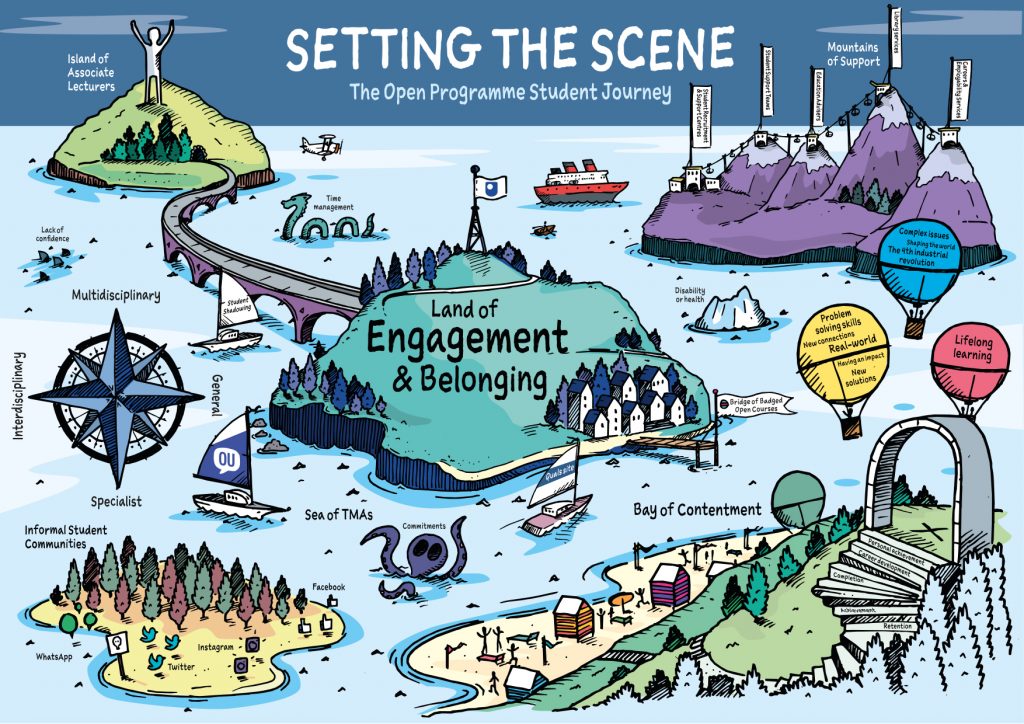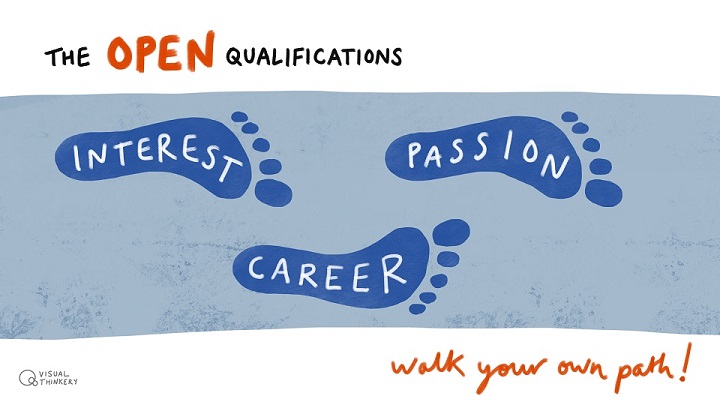 Rehana Awan is Student Communications and Engagement Manager in Curriculum Innovation, working primarily on designing and enhancing the student experience for Open Programme students and Associate Lecturer on the People, Work and Society Access module. Rehana is a Senior Fellow of the Higher Education Academy (SFHEA) and Fellow of the Staff and Educational Development Association (FSEDA). This blog post originally appeared on Rehana’s personal blog available here.
Rehana Awan is Student Communications and Engagement Manager in Curriculum Innovation, working primarily on designing and enhancing the student experience for Open Programme students and Associate Lecturer on the People, Work and Society Access module. Rehana is a Senior Fellow of the Higher Education Academy (SFHEA) and Fellow of the Staff and Educational Development Association (FSEDA). This blog post originally appeared on Rehana’s personal blog available here.
I have been talking about and referring to the 4th Industrial Revolution (4IR) or Industry 4.0 recently in meetings and presentations. I’ve been hearing the term a lot. I know it’s ‘a revolution that is changing the way we live, work and relate to each other’ (Schwab, 2016); but what does it really mean? Here is a bit of research as a starter-for-10; it’s related to my own environment of interdisciplinary/multidisciplinary (ID/MD) studies, as I believe this to be one the ships we should be boarding to sail the choppy seas into the 4IR.

This piece is not especially academic, it’s not particularly detailed, it may even be naïve and simplistic, but it’s enough as an introduction.
To start, a couple of definitions. The 4IR is an:
‘..intelligent, interconnected ecosystem’ (Wong, 2019)
and it is about:
New technologies bringing together the physical, digital and biological, cross-disciplines, economies and industries (Schwab, 2016)
The major technologies driving this revolution are:
- artificial intelligence (AI)
- precision medicine
- robotics
- mobile, cloud computing,
- analytics,
- automation,
- the Internet of Things (IoT),
- 3D printing,
- autonomous robots, and augmented- and virtual reality (AR/VR)
According to the experts, the 4IR has the potential to:
- reverse damage, particularly to the environment, from previous industrial revolutions through the way resources are managed
- challenge what it means to be human
- connect the world through digital networks
- improve efficiency
But there are raises concerns and issues with the 4IR, like how it will:
- create greater inequality
- shift power
- make governments, economies, countries unstable
- break-up societies
- mean some organisations might not be able to keep up or change
- mean some governments might not be able to harness the developments or regulate them (e.g. issues of cyberspace security).
This significant technological change promised by Industry 4.0 ‘means that our systems of health, transportation, communication, production, distribution, and energy…will be completely transformed’ (Wong, 2019). My children’s school is telling them it’s not known what the jobs of the future will look like and according to a study carried out in the U.S by the Mckinsey Global Institute, they are right! Their study states that between 8-9% of jobs by 2030 will be in new occupations that won’t have existed before. (Manyika, 2017).
Even though they may not have existed before, there is a bit of an idea of what they might look like. The World Economics Forum (WEF), suggest that new occupations may exist in the fields of AI and robotics and in non-tech fields like sales and training (WEF, 2018). The McKinsey study supports this view and goes further to say that careers which care for the elderly (to manage an aging population), are in green technology and consumer goods and services may see growth and off-set job losses caused by the shift to automation (Manyika, 2017).
To chart these waters, manage this change and this new context of multinational and national cooperation, it’s argued we’ll need new frameworks and new models of education (Wong, 2019). Whilst upskilling and reskilling of workers will be needed, which employers will need to take responsibility for, individuals will also need to take ownership of their lifelong learning (the government will also need to support and empower individuals). One of these educational frameworks, the model of ID/MD studies, isn’t that new but might be a possible solution that can be developed further. ID/MD studies already addresses the drawing together of learning across boundaries to solve complex real-world problems. A raised awareness of the benefits and values of ID/MD studies, the ability to articulate these to employers and University qualifications supporting this might enable us to ‘collaborate across geographies, sectors and disciplines to grasp the opportunities it [4IR] presents’ (Schwab, 2016).
We’re starting to see this in some parts of the Higher Education sector, for example the London Interdisciplinary School is offering transdisciplinary courses across the arts and sciences which are partnered with paid work-placements. This isn’t new of course, The Open University (OU) has been doing this since its inception in 1969. It offers students the opportunity to select modules that are of interest to their needs, motivations and career aspirations, with many students already in employment. The OU’s largest degree programme is the Open Programme which enables students to ‘pick n’ mix’ their modules to create a personalised and individualised pathway. Society, governments and employers need to wake up to the possibilities this type of studies has for our future.
The 4IR means we are moving to a new era; whether we can capitalise on this and succeed depends on whether we (individuals, organisations, government, education and so on) can adapt in time…
Reference list
Manyika., J. (2017), Technology, jobs and the future of work, Executive briefing, Mckinsey Global Institute, https://www.mckinsey.com/featured-insights/employment-and-growth/technology-jobs-and-the-future-of-work
Shwab., K., (2018), Globalisation 4.0 What does it mean? https://www.weforum.org/agenda/2018/11/globalization-4-what-does-it-mean-how-it-will-benefit-everyone/
Wong., C. (2019), Industry 4.0 could create millions of new jobs, Futir ithmic, https://www.futurithmic.com/2019/02/13/industry-4-0-could-create-millions-new-jobs/?utm_source=ppc&utm_medium=googleads&utm_campaign=ind4jobs&utm_content=0001&gclid=CjwKCAjwue3nBRACEiwAkpZhmU3Qq13EErfYyg86-Ei7lbrbEta7cQHfRBQVmli7pdVamL6jrf-puBoCwlgQAvD_BwE
World Economic Forum https://www.weforum.org/about/the-fourth-industrial-revolution-by-klaus-schwab
World Economic Forum, The Future of Jobs Report, 2018 http://www3.weforum.org/docs/WEF_Future_of_Jobs_2018.pdf
